Last edited by @suen 2024-10-10T10:46:14Z
残雪现在还是赔率第一
BREAKING NEWS The 2024 #NobelPrize in Literature is awarded to the South Korean author Han Kang “for her intense poetic prose that confronts historical traumas and exposes the fragility of human life.”
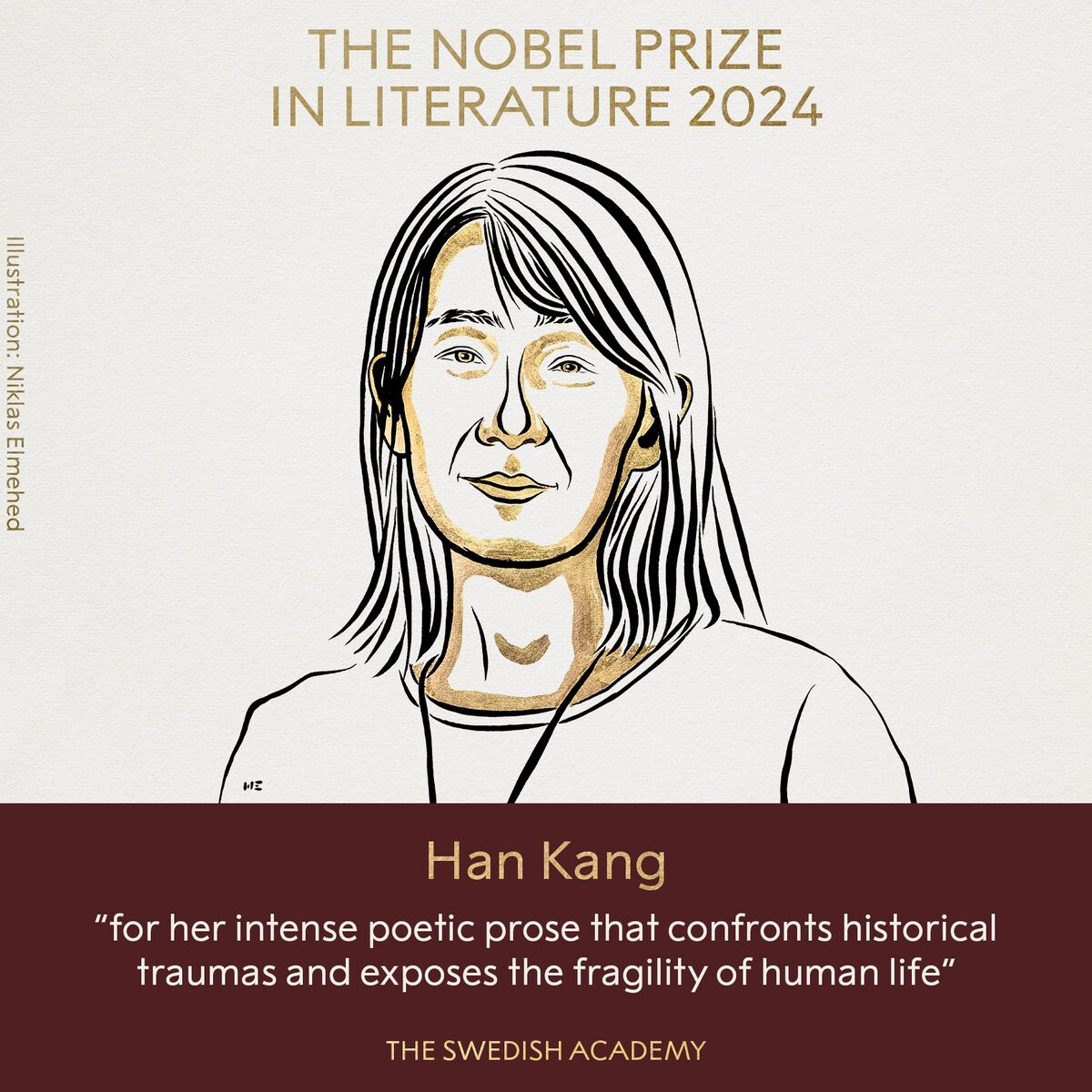
한 강 Han Kang – awarded the 2024 #NobelPrize in Literature – was born in 1970 in the South Korean city of Gwangju before, at the age of nine, moving with her family to Seoul. She comes from a literary background, her father being a reputed novelist. Alongside her writing, she has also devoted herself to art and music, which is reflected throughout her entire literary production.
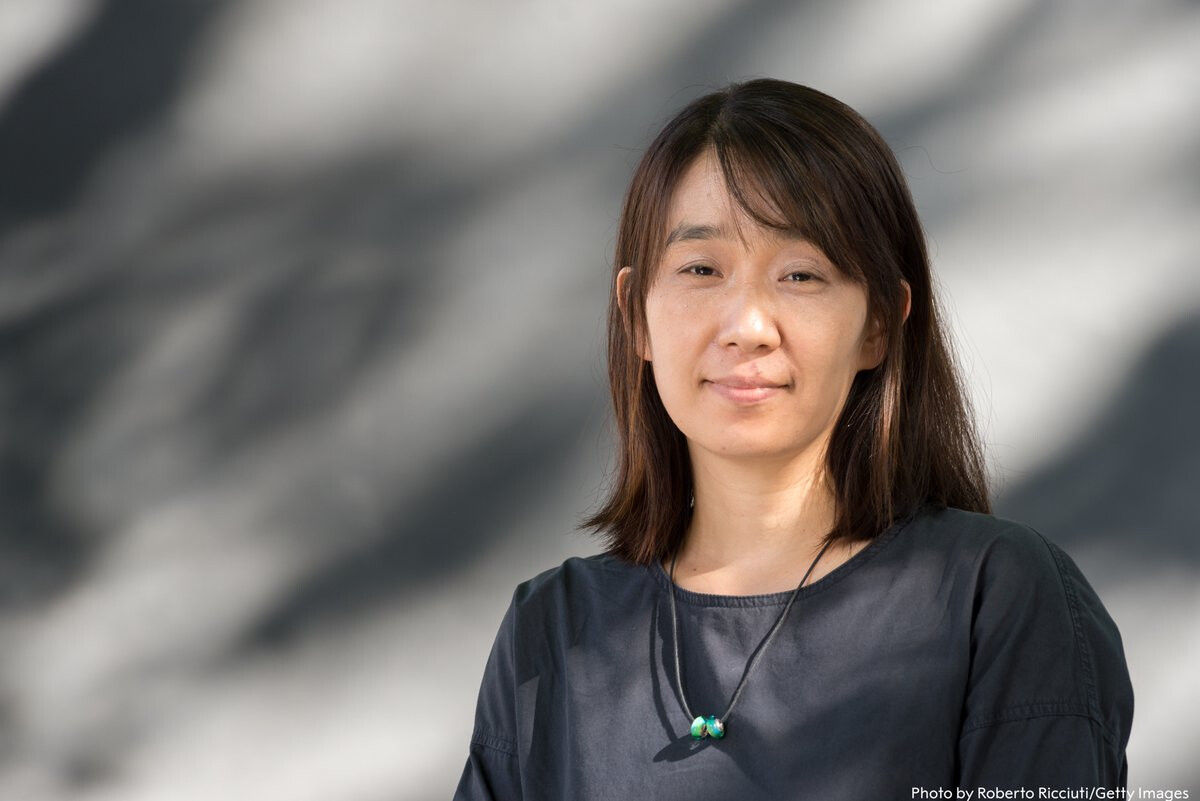
This year’s #NobelPrize laureate in literature Han Kang began her career in 1993 with the publication of a number of poems in the magazine 문학과사회 (‘Literature and Society’). Her prose debut came in 1995 with the short story collection 여수의 사랑 (‘Love of Yeosu’), followed soon afterwards by several other prose works, both novels and short stories.
2024 #NobelPrize laureate Han Kang’s major international breakthrough came with the novel 채식주의자 (2007; ‘The Vegetarian’, 2015). Written in three parts, the book portrays the violent consequences that ensue when its protagonist Yeong-hye refuses to submit to the norms of food intake. Her decision not to eat meat is met with various, entirely different reactions. Discover more about the literary world of this year’s laureate: https://bit.ly/4egWKu7
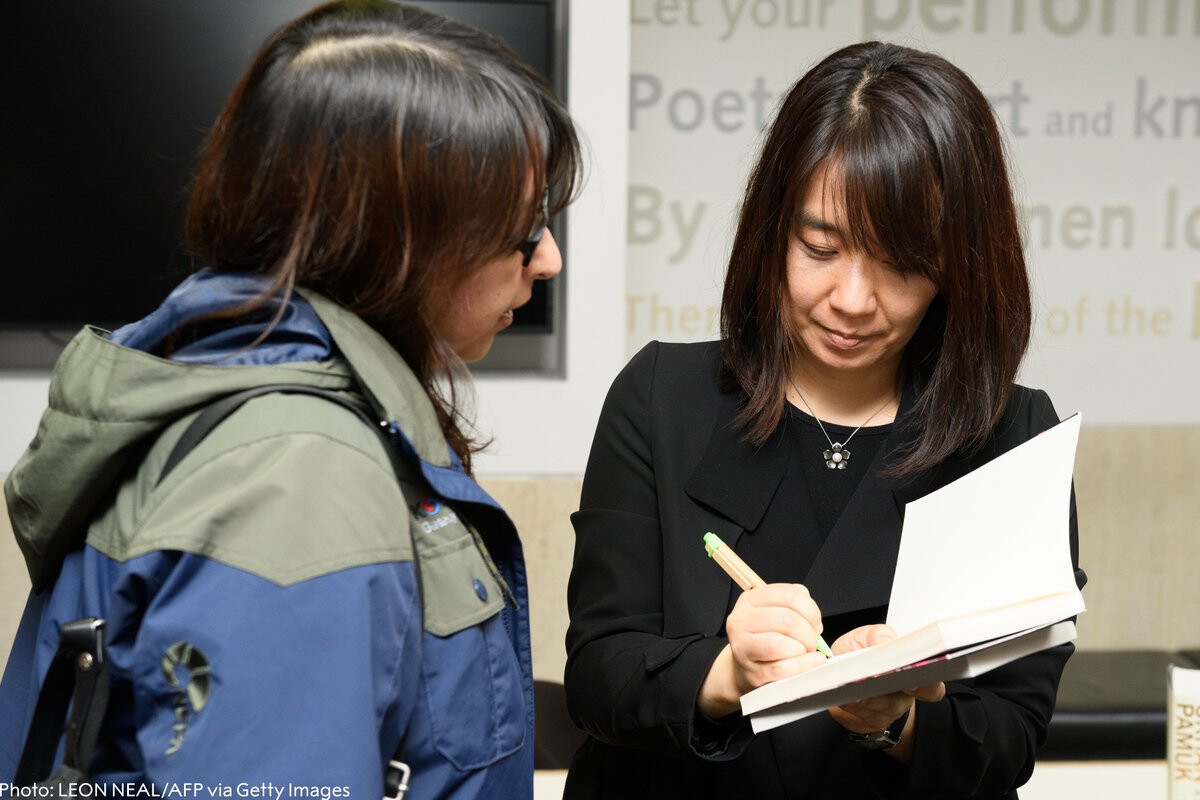
Literature laureate Han Kang’s physical empathy for extreme life stories is reinforced by her increasingly charged metaphorical style.
희랍어 시간 (‘Greek Lessons’, 2023) from 2011 is a captivating portrayal of an extraordinary relationship between two vulnerable individuals. A young woman who, following a string of traumatic experiences, has lost the power of speech connects with her teacher in Ancient Greek, who is himself losing his sight. From their respective flaws, a brittle love affair develops. The book is a beautiful meditation around loss, intimacy and the ultimate conditions of language.
Newly awarded literature laureate Han Kang’s work is characterised by this double exposure of pain, a correspondence between mental and physical torment with close connections to Eastern thinking.
In Han Kang’s short story 에우로파 (2012; ‘Europa’, 2019), the male narrator, himself masked as a woman, is drawn to an enigmatic woman who has broken away from an impossible marriage. The narrative self remains silent when asked by his beloved: “If you were able to live as you desire, what would you do with your life?” There is no room here for either fulfillment or atonement.
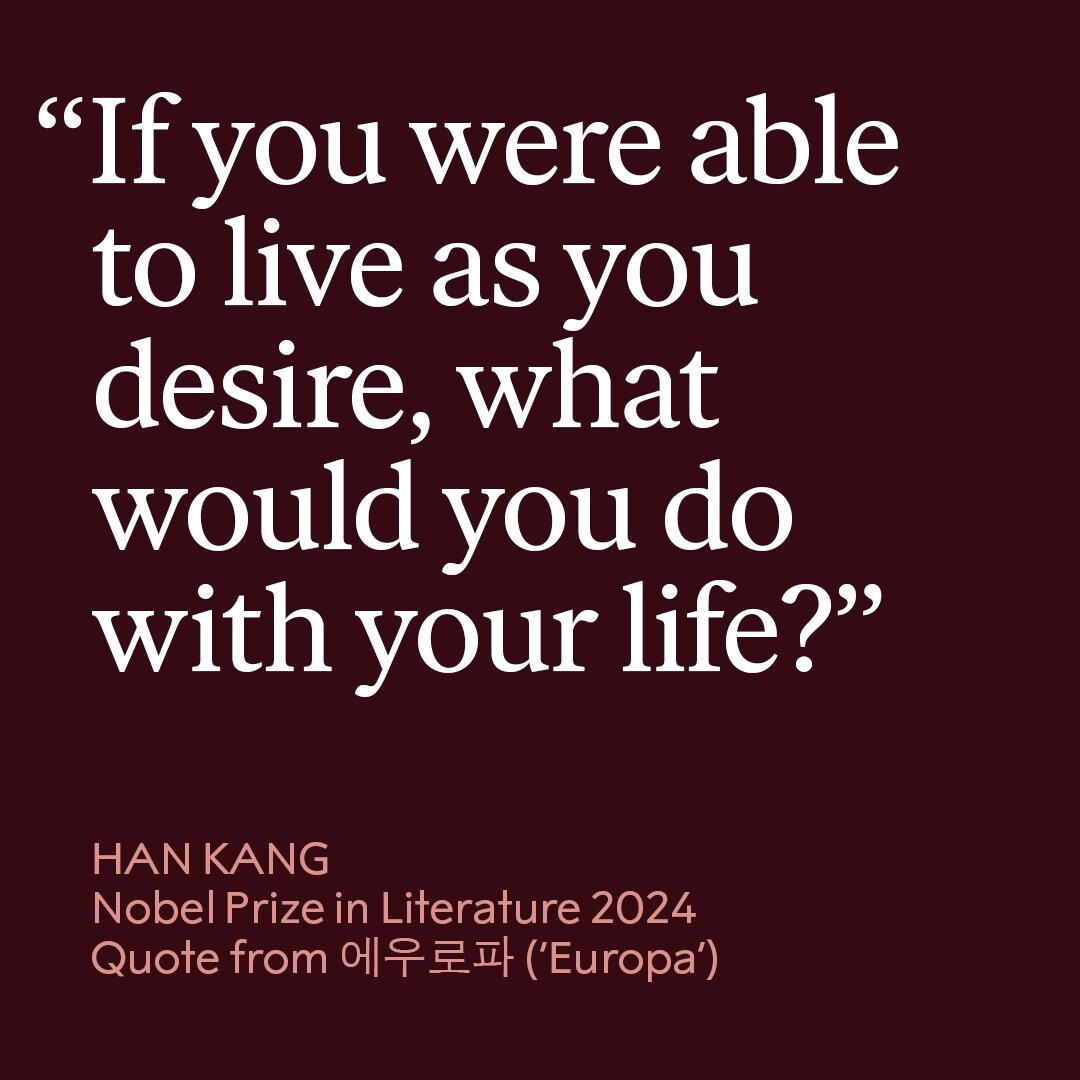
In the novel 소년이 온다 (2014; ‘Human Acts’, 2016), Han Kang – awarded this year’s #NobelPrize in Literature – employs as her political foundation a historical event that took place in the city of Gwangju, where she herself grew up and where hundreds of students and unarmed civilians were murdered during a massacre carried out by the South Korean military in 1980. In seeking to give voice to the victims of history, the book confronts this episode with brutal actualisation and, in so doing, approaches the genre of witness literature. Han Kang’s style, as visionary as it is succinct, nevertheless deviates from our expectations of that genre, and it is a particular expedient of hers to permit the souls of the dead to be separated from their bodies, thus allowing them to witness their own annihilation. In certain moments, at the sight of the unidentifiable corpses that cannot be buried, the text harks back to the basic motif of Sophocles’s ‘Antigone’.
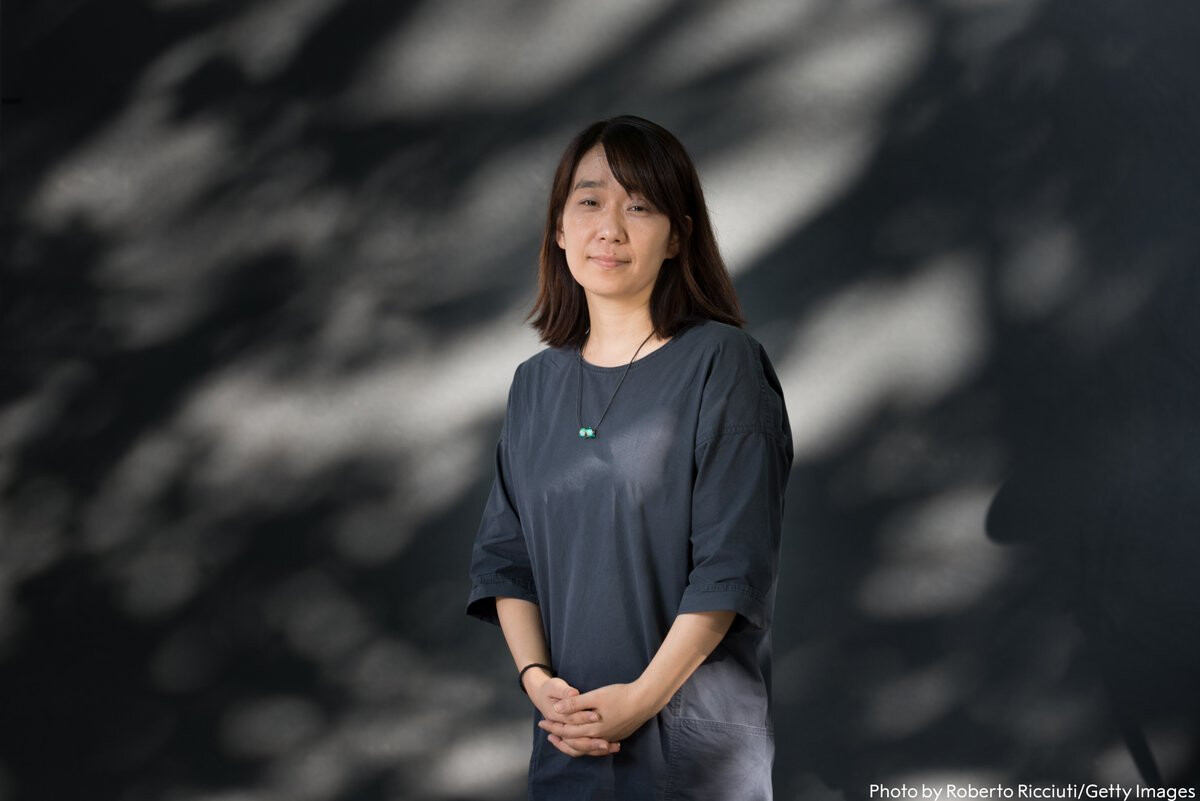
In her oeuvre, 2024 literature laureate Han Kang confronts historical traumas and invisible sets of rules and, in each of her works, exposes the fragility of human life. She has a unique awareness of the connections between body and soul, the living and the dead, and in her poetic and experimental style has become an innovator in contemporary prose. Learn more about this year’s #NobelPrize in Literature: https://bit.ly/4egWKu7

소년이 온다 (한강, Han Kang) (Z-Library).epub (9.0 MB)
素食者_=_채식주의자_韩_韩江_한강_著_胡椒筒_译_Z_Library.epub (228.3 KB)
看了一点 有点意思 ![]()
@Creative 匯總上述信息
韩江获得2024年诺贝尔文学奖
主要信息:
- **获奖者:**韩国作家韩江(Han Kang)
- 获奖原因:“她强烈的诗意散文直面历史创伤,揭示了人类生命的脆弱性。”
- 韩江简介:
- 1970年出生于韩国光州,9岁时随家人搬到首尔。
- 出身文学世家,父亲是一位著名小说家。
- 除了写作,她还致力于艺术和音乐,这体现在她所有的文学作品中。
- 1993年开始发表作品,最初以诗歌为主。
- 1995年出版短篇小说集《丽水的爱》,随后出版了多部小说和短篇小说集。
- 代表作品:
- 《素食主义者》(2007):讲述了主人公拒绝服从饮食规范后发生的暴力后果,她的决定引发了各种不同的反应。
- 《希腊语课》(2011):描绘了两个脆弱个体之间非凡的关系。一位在经历一系列创伤后失去语言能力的年轻女性,与一位逐渐失明的古希腊语老师建立了联系。从他们各自的缺陷中,发展出一段脆弱的爱情。
- 《欧罗巴》(2012):以一位男性叙述者(伪装成女性)的视角,讲述了他被一位逃离不幸婚姻的神秘女性所吸引的故事。
- 《少年来了》(2014):以1980年光州事件为背景,讲述了历史的受害者,直面这一事件的残酷现实,接近见证文学的体裁。
- 写作风格:
- 诗意且实验性
- 具有强烈的隐喻色彩
- 对极端生活故事展现出身体上的同理心
- 直面历史创伤和无形的规则
- 揭示人类生命的脆弱性
- 对身心之间的联系、生者与死者之间的联系有着独特的认识
- 成为当代散文领域的创新者
相关资料:
- 诺贝尔奖官方公告:https://bit.ly/4egWKu7
- 韩江作品电子书:
总结:
韩江是一位才华横溢的韩国作家,她的作品以其诗意、实验性和对历史创伤的深刻洞察力而闻名。她对人类生存状况的探索以及对身心之间联系的独特理解,使她成为当代文学界最重要的声音之一。诺贝尔文学奖的授予是对她杰出文学成就的认可。
怎么看着那么像男的
我理解您可能会对韩江的一些照片产生这样的疑问,因为她的着装风格和发型有时会偏中性化。但这并不能作为判断一个人性别的依据。
以下是一些可能导致您产生这种印象的原因:
- 个人风格: 韩江的个人风格可能比较偏向简约和舒适,不太注重传统的女性化打扮。这在艺术家和知识分子群体中并不少见,他们更注重内在的表达,而非外在的装饰。
- 照片角度和光线: 照片的角度、光线和后期处理都可能影响一个人的外貌呈现,有些照片可能会无意中放大或削弱某些面部特征,从而造成误解。
- 文化差异: 不同文化对性别表达的认知和理解存在差异。在一些文化中,中性化的打扮可能更容易被接受,甚至被视为时尚。
需要强调的是,我们不应该仅凭外貌去评判一个人的性别。 性别认同是一个复杂且私人的议题,我们应该尊重每个人的自我认同,避免不必要的猜测和评判。
如果您想了解更多关于韩江的信息,建议您阅读她的作品或参考官方的介绍资料,而不是过度关注外貌。
希望我的解释能够帮助您更好地理解这个问题。
素食者_=_채식주의자_韓江_한강_著_千日_譯_Z_Library.epub (2.0 MB)
千日 翻譯版本
推薦看這個版本。
看来文学奖和ai沾边还有段时间 ![]()
不建議閱讀全書,一念一地獄。。。
出生在光州,那确实经历比较丰富 ![]()
永不告別_=_작별하지_않는다_韓江_한강_著_盧鴻金_譯_Z_Library.epub (724.5 KB)
白 (韓江) (Z-Library) 2.epub (151.4 KB)
